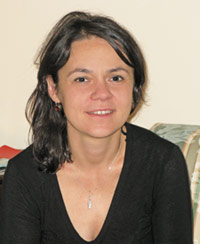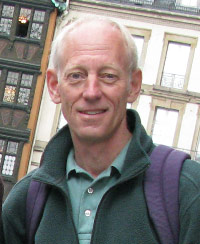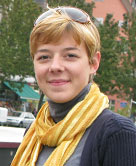
Assistant Professor of Humanities Ewa Chrusciel, Florence
My Pathway class is about human desire in literature, and it coincides so well with this program. It's so rewarding to study Dante, Petrarca and Leopardi in Florence. The highlights were three Italian guest speakers. After the class we went to a trattoria with them, and I could see by the way my students engaged in conversation with them how interested in such cultural exchange they were. This is why I also organized a trip to the Alps where students stayed with Italian families.
The intensity of the experience here makes it seem that we all are taking an extra course here: “culture immersion.” I think our neurons here are asked to fire faster and more often. Thank goodness I have a resident director, Candace Ruta, who helps students to deal with their everyday issues. It would be much more challenging without her.
I'm very impressed with how the students are doing. This group is very independent. They are doing well despite some of them being homesick. I am impressed by how well they have adjusted to the intense life here and are thriving. In class they are dynamic and engaged.
My challenges here are to encourage students to make good decisions, especially when it comes to finding a balance between studies and traveling, and to establish appropriate academic standards which will ensure they make a productive transition to the learning environment of the Colby-Sawyer campus. Students are learning here how to make choices, because one is simply not able to take advantage of all the cultural possibilities! They are relearning how to see and think from a different angle, how to be open to a different perspective.
Ewa Chrusciel, assistant professor of humanities, holds a master's degree from Jagiellonian University in Krakow, Poland and a doctorate degree from Illinois State University. She joined Colby-Sawyer in 2006 and, as an award-winning poet, has presented papers and read poetry in the United States and Europe, including Italy.

Professor of Natural Sciences Bill Thomas, Strasbourg
This group is tight, they're very supportive of each other. There are dual expectations of getting them to be college students and getting to see Europe, but we're working through how to do that. The majority of these students are really talented and working well, balancing things and taking every opportunity that comes along. There are others who are struggling with the transition to college, but that's normal.
The Château is a neat place where the students can focus on work, but there's no automatic contact with French people; it has to be generated. We have to do more to bring them to a functional level in the language. It takes a while in the culture for that sense of functionality to mature. We need to find a way to optimize their experience sooner. The semester goes by so fast.
These kids are given every opportunity to take a new perspective on things and there are an awful lot of variables as to how they do that. There is no question that some are going to go back changed in fundamental ways and be brimming at the seams to share that with others.
Professor Bill Thomas holds master's and doctorate degrees from Princeton University and joined Colby-Sawyer in 1991. He spent his junior year as an undergraduate studying in Paris, and returned in 1999 for a year-long sabbatical to conduct research at the Curie Institute. In the spring 2007 semester he spent a second sabbatical at the Curie Institute, and his work there continues for six weeks each summer.



